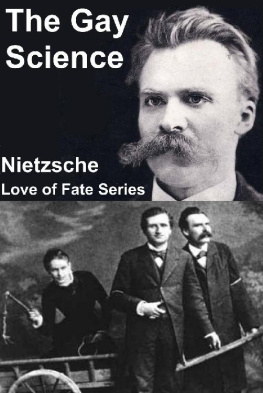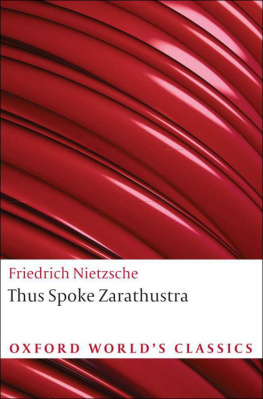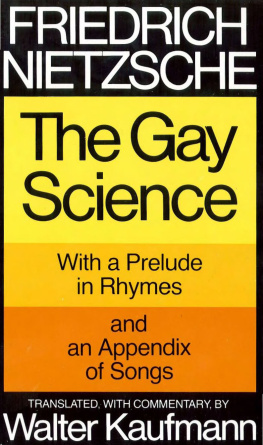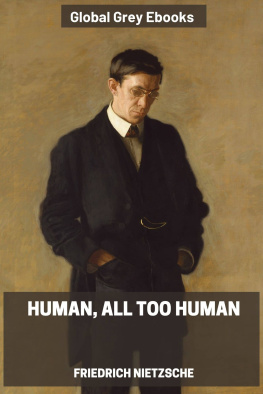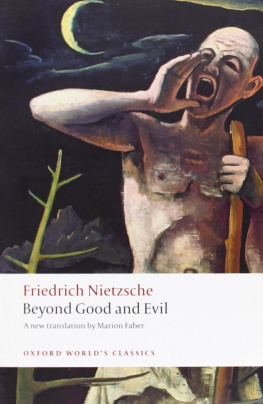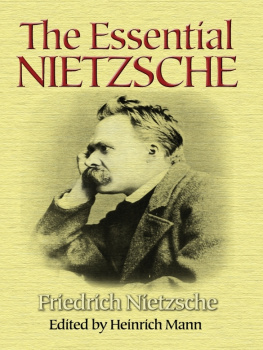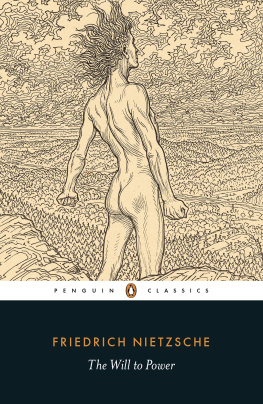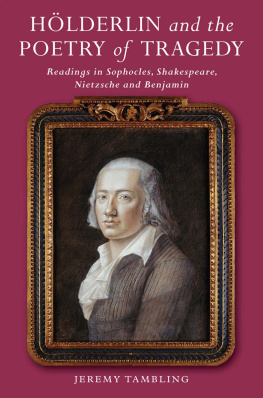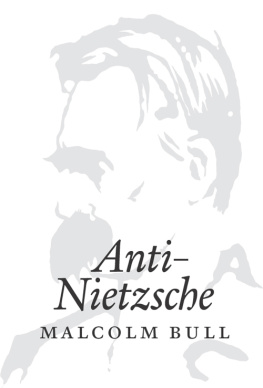Friedrich Nietzsche - The Birth of Tragedy
Here you can read online Friedrich Nietzsche - The Birth of Tragedy full text of the book (entire story) in english for free. Download pdf and epub, get meaning, cover and reviews about this ebook. publisher: Penguin Group USA, Inc., genre: Science. Description of the work, (preface) as well as reviews are available. Best literature library LitArk.com created for fans of good reading and offers a wide selection of genres:
Romance novel
Science fiction
Adventure
Detective
Science
History
Home and family
Prose
Art
Politics
Computer
Non-fiction
Religion
Business
Children
Humor
Choose a favorite category and find really read worthwhile books. Enjoy immersion in the world of imagination, feel the emotions of the characters or learn something new for yourself, make an fascinating discovery.
- Book:The Birth of Tragedy
- Author:
- Publisher:Penguin Group USA, Inc.
- Genre:
- Rating:3 / 5
- Favourites:Add to favourites
- Your mark:
- 60
- 1
- 2
- 3
- 4
- 5
The Birth of Tragedy: summary, description and annotation
We offer to read an annotation, description, summary or preface (depends on what the author of the book "The Birth of Tragedy" wrote himself). If you haven't found the necessary information about the book — write in the comments, we will try to find it.
The Birth of Tragedy — read online for free the complete book (whole text) full work
Below is the text of the book, divided by pages. System saving the place of the last page read, allows you to conveniently read the book "The Birth of Tragedy" online for free, without having to search again every time where you left off. Put a bookmark, and you can go to the page where you finished reading at any time.
Font size:
Interval:
Bookmark:

THE BIRTH OF TRAGEDY
FRIEDRICH NIETZSCHE was born near Leipzig in 1844, the son of a Lutheran clergyman. He attended the famous Pforta School, then went to university at Bonn and at Leipzig, where he studied philology and read Schopenhauer. When he was only twenty-four he was appointed to the chair of classical philology at Basle University; he stayed there until his health forced him into retirement in 1879. While at Basle he made and broke his friendship with Wagner, participated as an ambulance orderly in the Franco-Prussian War, and published The Birth of Tragedy (1872), Untimely Meditations (1873-6) and the first part of Human, All Too Human (1878; two supplements entitled Assorted Opinions and Maxims and The Wanderer and his Shadow followed in 1879 and 1880 respectively). From 1880 until his final collapse in 1889, except for brief interludes, he divorced himself from everyday life and, supported by his university pension, he lived mainly in France, Italy and Switzerland. The Dawn appeared in 1881 followed by The Gay Science in the autumn of 1882. Thus Spoke Zarathustra was written between 1883 and 1885, and his last completed books were Ecce Homo, an autobiography, and Nietzsche contra Wagner. He became insane in 1889 and remained in a condition of mental and physical paralysis until his death in 1900.
SHAUN WHITESIDE was was born in Dungannon, Northern Ireland, in 1959, and educated at Dungannon Royal School and Kings College, Cambridge, where he graduated with a First in Modern Languages. He has translated widely from German, French and Italian, and his translations of Arthur Schnitzlers Beatrice and Her Son and Robert Musils The Confusions of Young Trless are published by Penguin.
MICHAEL TANNER was educated in the RAF and at Cambridge University, where he was a Lecturer in Philosophy until 1997 and is a Fellow of Corpus Christi College. He is equally interested in philosophy, music and literature, his particular areas being Friedrich Nietzsche and Richard Wagner. He has written for many journals, contributed The Total Work of Art to The Wagner Companion, and is the author of Nietzsche(1995) and Wagner (1996).
FRIEDRICH NIETZSCHE
Tragedy
Out of the Spirit of Music
Translated by SHAUN WHITESIDE
Edited by MICHAEL TANNER
PENGUIN BOOKS
PENGUIN BOOKS
Published by the Penguin Group
Penguin Books Ltd, 80 Strand, London WC2R 0RL, England
Penguin Putnam Inc., 375 Hudson Street, New York, New York 10014, USA
Penguin Books Australia Ltd, 250 Camberwell Road, Camberwell, Victoria 3124, Australia
Penguin Books Canada Ltd, 10 Alcorn Avenue, Toronto, Ontario, Canada M4V 3B2
Penguin Books India (P) Ltd, 11 Community Centre, Panchsheel Park, New Delhi 110 017, India
Penguin Books (NZ) Ltd, Cnr Rosedale and Airborne Roads, Albany, Auckland, New Zealand
Penguin Books (South Africa) (Pty) Ltd, 24 Sturdee Avenue, Rosebank 2196, South Africa
Penguin Books Ltd, Registered Offices: 80 Strand, London WC2R 0RL, England
www.penguin.com
This edition first published 1993
Reprinted with a new Chronology 2003
20
Translation copyright Shaun Whiteside, 1993
Editorial matter copyright Michael Tanner, 1993
All rights reserved
The moral right of the translator and editor has been asserted
Except in the United States of America, this book is sold subject to the condition that it shall not, by way of trade or otherwise, be lent, re-sold, hired out, or otherwise circulated without the publishers prior consent in any form of binding or cover other than that in which it is published and without a similar condition including this condition being imposed on the subsequent purchaser
ISBN: 9781101488584
The Birth of Tragedy (henceforth BT) was Friedrich Nietzsches first book. The first edition, published on 2 January 1872, had as its full title The Birth of Tragedy out of the Spirit of Music, as did the second, very slightly revised edition of 1874. When he reissued it in 1886, Nietzsche renamed it The Birth of Tragedy. Or: Greekhood and Pessimism. New Edition with an Attempt at a Self-Criticism. The impact of its first publication was very considerable, though not, for the most part, in the way that Nietzsche could have hoped. Certainly its dedicatee, Richard Wagner, was thrilled by it, and wrote to Nietzsche: I have never read anything more beautiful than your book!, and Wagners wife Cosima followed up with: You have summoned spirits in this book which I believed were only forthcoming at the behest of our Master. Those reactions, and similar ones from Nietzsches Wagnerian friends, were not surprising, in the light of the contents, especially of the later stretches of the work. But academic opinion was outraged, as was only to be expected, though it seems that Nietzsche had not anticipated it. An old enemy from his schooldays, Ulrich von Wilamowitz-Moellendorf, fired an initial salvo in May with the title Philology of the Future! A Reply to Friedrich Nietzsches Birth of Tragedy, a piece of abusive academic polemic remarkable even by the standards that prevail in the world of scholarship. Nietzsche didnt reply himself, but his close friend Erwin Rohde weighed in with a rejoinder in the form of an open letter to Wagner, called Afterphilologie!, a difficult word to translate: it means, roughly, Pseudo-Philology, but After is also the German for arse, and there is a long tradition, not perhaps altogether unexpectedly stemming from Luther, of using the word in both senses simultaneously. Wagner, too, joined in the fight; and Wilamowitz continued the undignified squabble. Like all such battles, the outcome was indecisive, except that there was no doubt that Nietzsche had done himself a great deal of harm in professional circles, at the same time as he had decisively launched himself on the cultural scene.
As we shall see, when he came to write his Attempt at a Self-Criticism in 1886, Nietzsche was far harsher on the book than any of his academic critics had been, their grounds for disapproval being only one element in the many-pronged critique he directs against the work. So what we now have is a bewildering whole, if we see it as that: the main body of the book is angrily denounced in the Attempt, at the same time as he tries to perform a rescue operation, claiming that in certain respects this impossible book contains insights which he muddied by introducing jarring and incongruous elements, but which show that in certain crucial respects he was already on the main path of his lifes work. It is, of course, a familiar tactic with authors looking with mixed feelings on their earliest productions, but in this case, more than usually, it presents questions about the nature of self-interpretation and development. What I shall do, in the first place, is to concentrate on the first edition, since that presents quite enough problems in itself, and then go on to deal with aspects of the Attempt which are genuinely enlightening about what Nietzsche originally said, as opposed to what he later wished that he had said.
What kind of book is BT? That turns out to be so hard to answer that some commentators on it have concluded that it is sui generis, never a helpful category to invoke, since it provides one with no criteria for judging it by. The shortest answer is that, for all its brevity, it is a work which is attempting to do many things more or less simultaneously. The opening of the book proper is We shall have gained much for the science of aesthetics, suggesting that what we are going to be offered, in line with the title, is a treatise on art, specifically on Greek tragedy. On the other hand, in the Preface to Richard Wagner, he refers to the seriously German problem that we are dealing with, a vortex and turning point at the very centre of German hopes, and also to his conviction that art is the highest task and the truly metaphysical activity of this life. So it would seem, and what follows bears this out, that Nietzsche has three major concerns (at least) going in tandem: a political-cultural one, a claim to be worked out about the nature of metaphysics, and a consideration of a specific phenomenon in the history of art. These were always to be central issues in his work, but what marks off
Font size:
Interval:
Bookmark:
Similar books «The Birth of Tragedy»
Look at similar books to The Birth of Tragedy. We have selected literature similar in name and meaning in the hope of providing readers with more options to find new, interesting, not yet read works.
Discussion, reviews of the book The Birth of Tragedy and just readers' own opinions. Leave your comments, write what you think about the work, its meaning or the main characters. Specify what exactly you liked and what you didn't like, and why you think so.


